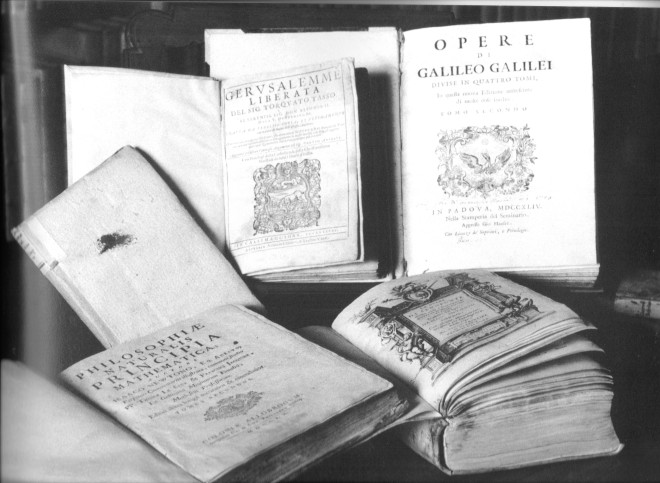This library has survived intact for over 200 years thanks to Giacomo Leopardi (1798-1837), one of Italy’s best-loved poets. He spent the greater part of his childhood and youth reading in this library, the creation of his father, Monaldo Leopardi.
The Italian class system is not the same as ours; however, I think it is safe to say that the Leopardi were what we would call gentry, and quite comfortably off. Monaldo was an “avid book collector” (p 363 of Canti / Giacomo Leopardi ; translated and annotated by Jonathan Galassi. London : Penguin, c2010). In fact he spent so much money on this library that his wife had to sell her jewellery to restore the family fortunes.
I like Monaldo because he was more than a bibliophile. His instincts were those of a librarian; in other words, he wanted to share his books with everyone.
![To children friends citizens Monaldo Leopardi [gives] the library in the year 1812](https://beautifulbooksinitaly.wordpress.com/wp-content/uploads/2016/09/filiis-amicis-civibus-dedication-by-monaldo-leopardi-of-his-library.jpg?w=660)

This was Giacomo’s favourite room, from whose window he could see the bustling piazza and see and hear Teresa (whom he called Silvia), a maidservant, weaving and singing. Have a look at my other blog for more about this.
Monaldo took advantage of the Napoleonic suppressions of religious houses in Rome to offer a temporary home to their books, many of which he bought when they were being sold off by the authorities. He remarked that the two French occupations of Rome (1798-99 and 1809-14) were “tempo felicissimo per l’acquisto dei libri, perché se ne mise in commercio una massa immensa, spettante non solo a i conventi soppressi, ma a cardinali, prelati, avvocati e gente di ogni classe [a most fortunate time to buy books, because there was a vast mass of them on the market, belonging not only to the suppressed convents, but to cardinals, prelates, lawyers and people of every class]” .He said he would give the books back when the convents and monasteries re-opened, but somehow he never did. He was in good company – a lot of manuscripts and books went to the Vatican, and the most valuable ones are still there. I found this out at a conference I went to in 2012 – here is the link for those who are interested. http://www.bodleian.ox.ac.uk/__data/assets/pdf_file/0003/122187/2012_MonasticABSTRACTS.pdf
There are a number of incunables in Monaldo’s library, which are not on display, presumably because most visitors are interested in his son the poet and the books he used. However, I searched for Recanati in what my readers already know is my favourite catalogue, the British Library’s Incunabula Short Title Catalogue, and found this:
Juvenalis, Decimus Junius
Title: Satyrae (Comm[entators]: Antonius Mancinellus; Domitius Calderinus; Georgius Merula; Georgius Valla)
Imprint: Venice: Johannes Tacuinus, de Tridino, 24 July 1498 [Giovanni Tacuino]
For a reproduction of the title page follow this link: https://download.digitale-sammlungen.de/pdf/1472833879bsb00054972.pdf and scroll down.
The guide took pains to point out to us the “Prohibiti” section. These are books on the Index Librorum Prohibitorum”, i.e.forbidden by the Roman Catholic church, but Monaldo had obtained permission not only to possess them but for himself and his family to read them.
Giacomo was an omnivorous bookworm, with a photographic memory and a love of languages. He taught himself Greek and Hebrew from Dr Brian Walton’s (former Bishop of Chester) 1657 polyglot Bible, printed in London with a dedication to Cromwell, the Lord Protector and effective ruler of England in the absence of a monarch. After the Restoration in 1660 Walton tried to get back as many copies as he could and replace the dedication to Cromwell with one to King Charles II.

Monaldo Leopardi was a political conservative, though apparently he declared his support for Napoleon and thus protected his family and library, and I wonder whether he was aware of, and what he thought of,Walton’s Bible’s chequered history.

The books in the photo give you a good idea of Giacomo’s wide-ranging tastes, though I hope they were only arranged like that for the photograph.
Monaldo doesn’t seem to have had a librarian. Who needs a librarian when you can get your children to do the cataloguing? There’s nothing new about getting your readers to volunteer, and this seems to have been the way Monaldo related to his children. We are certainly supposed to come away with the impression that they quite enjoyed it.
In his poem “A Silvia”, Giacomo does say, “Io gli studi leggiadri Talor lasciando e le sudate carte”, which Galassi translates as “Sometimes I left the cherished books and labored pages”. I’m relieved to know that the poet did have other interests.
So was Giacomo Leopardi a librarian’s ideal reader? Or would he have been a bit of a know-all. I’d love to know what you think.

The things you learn visiting blogs!
I knew he read voraciously, but was not aware Giacomo Leopardi had a library that still standing. 🙂
LikeLiked by 1 person
I found out that it is open to the public thanks to Victoria of the blog Send in the Librarians.
https://sendinthereallibrarians.wordpress.com/
LikeLiked by 1 person
Reblogged this on Hill towns of Le Marche, Italy and commented:
If you liked my post about Leopardi in Recanati, you’ll like this.
LikeLike
Reblogged this on Make Italy Yours.
LikeLike
Thank you Stefania for the Reblog!
LikeLiked by 1 person
You are welcome, Alys!
LikeLike
You are welcome, grazie a te, Alys!
LikeLike
Thank you Alys!
LikeLike